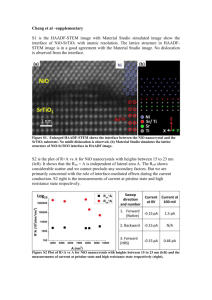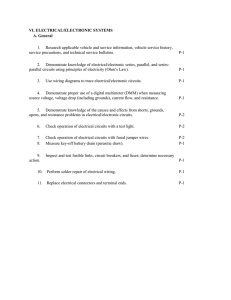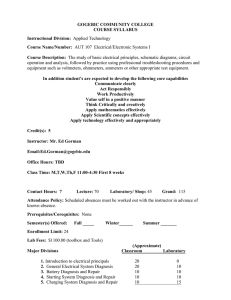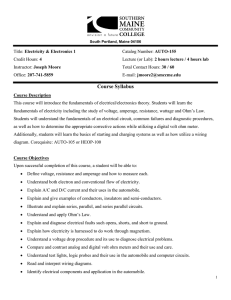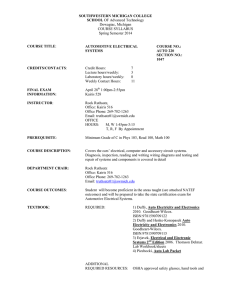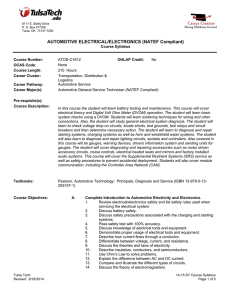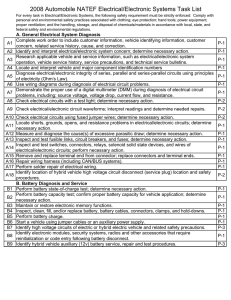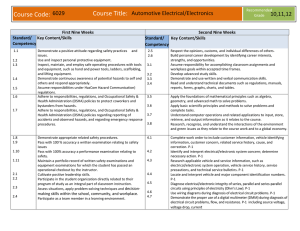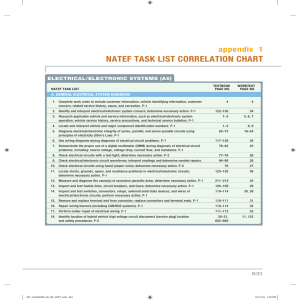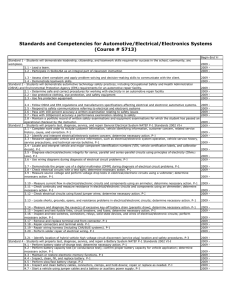Louisiana Delta Community College Academic Affairs Master Syllabus
advertisement
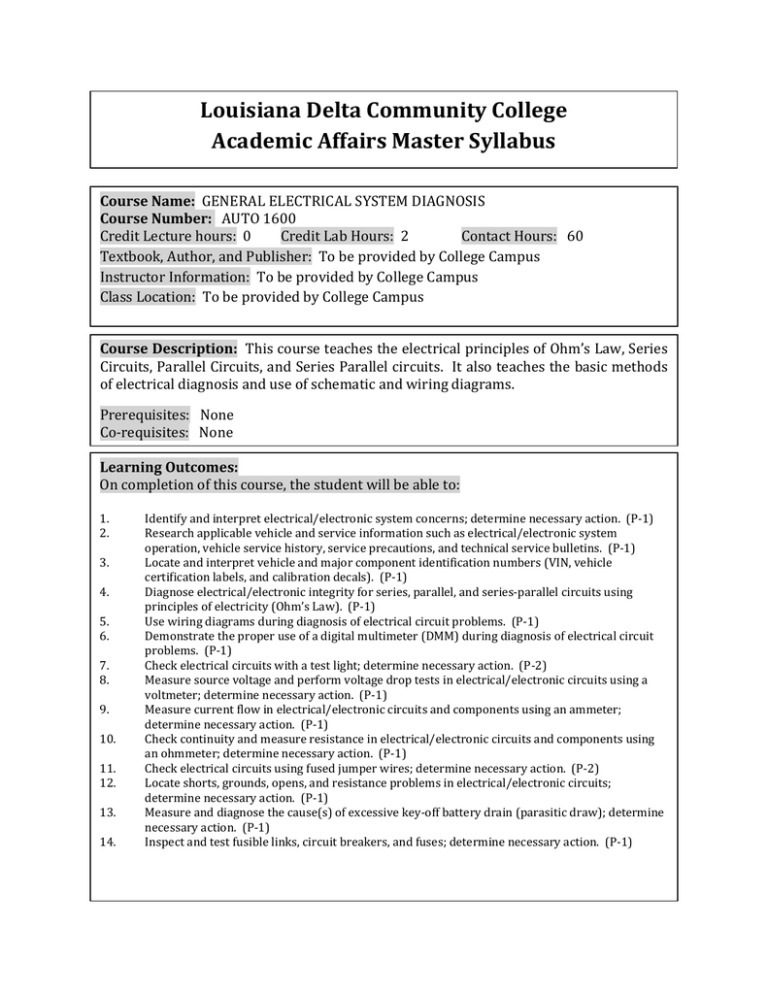
Louisiana Delta Community College Academic Affairs Master Syllabus Course Name: GENERAL ELECTRICAL SYSTEM DIAGNOSIS Course Number: AUTO 1600 Credit Lecture hours: 0 Credit Lab Hours: 2 Contact Hours: 60 Textbook, Author, and Publisher: To be provided by College Campus Instructor Information: To be provided by College Campus Class Location: To be provided by College Campus Course Description: This course teaches the electrical principles of Ohm’s Law, Series Circuits, Parallel Circuits, and Series Parallel circuits. It also teaches the basic methods of electrical diagnosis and use of schematic and wiring diagrams. Prerequisites: None Co-requisites: None Learning Outcomes: On completion of this course, the student will be able to: 1. 2. 3. 4. 5. 6. 7. 8. 9. 10. 11. 12. 13. 14. Identify and interpret electrical/electronic system concerns; determine necessary action. (P-1) Research applicable vehicle and service information such as electrical/electronic system operation, vehicle service history, service precautions, and technical service bulletins. (P-1) Locate and interpret vehicle and major component identification numbers (VIN, vehicle certification labels, and calibration decals). (P-1) Diagnose electrical/electronic integrity for series, parallel, and series-parallel circuits using principles of electricity (Ohm’s Law). (P-1) Use wiring diagrams during diagnosis of electrical circuit problems. (P-1) Demonstrate the proper use of a digital multimeter (DMM) during diagnosis of electrical circuit problems. (P-1) Check electrical circuits with a test light; determine necessary action. (P-2) Measure source voltage and perform voltage drop tests in electrical/electronic circuits using a voltmeter; determine necessary action. (P-1) Measure current flow in electrical/electronic circuits and components using an ammeter; determine necessary action. (P-1) Check continuity and measure resistance in electrical/electronic circuits and components using an ohmmeter; determine necessary action. (P-1) Check electrical circuits using fused jumper wires; determine necessary action. (P-2) Locate shorts, grounds, opens, and resistance problems in electrical/electronic circuits; determine necessary action. (P-1) Measure and diagnose the cause(s) of excessive key-off battery drain (parasitic draw); determine necessary action. (P-1) Inspect and test fusible links, circuit breakers, and fuses; determine necessary action. (P-1) Learning Outcomes: On completion of this course, the student will be able to: 15. Inspect and test wit=itches, connectors, relays, solid state devices, and wires of electrical/electronic circuits; perform necessary action. (P-1) 16. Repair wiring harnesses and connectors. (P-1) 17. Perform solder repair of electrical wiring. (P-1) Assessment Measures: To be provided by the College Campus. Library Resource Center: The Delta Library and Learning Resource Center is committed to providing quality information and learning resources and services, including technology, in supporting the overall mission of Delta Community College and its commitment to lifelong learning. Special Accommodations: Louisiana Delta Community College complies with Section 504 of the Rehabilitation Act, as well as the Americans with Disabilities Act. Students with disabilities who attend the Monroe campus may make a request by contacting the Director of Counseling and Disability Services (345-9152, Room 155) at the beginning of each semester. Reasonable accommodations will be attempted for students with documented disabilities. If an impairment is identified later in the semester, a non-retroactive accommodation plan will be developed. Students at satellite campuses should contact the Coordinator of Student Affairs at their particular campus. Student Code of Conduct: Louisiana Delta Community College encourages an environment of academic integrity and mutual respect. Students should read and follow both academic and behavioral expectations identified in the Code of Student Conduct that can be found online at www.ladelta.edu. Students are expected to act with integrity, respect the rights of others, and conduct themselves in a professional manner. The Honor Code prohibits academic misconduct such as cheating, engaging in unauthorized collaboration, and plagiarism. Violations of the Code of Student Conduct may result in disciplinary action as provided in the Code. Incidents are reported through the online Student Conduct system.
